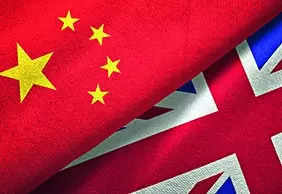LONDON: China’s size and ambition has enabled it to successfully penetrate every sector of the UK‘s economy, an influential parliamentary panel has said, warning that Beijing’s national imperative continues to become a technological and economic superpower on which other countries are reliant, which represents the “greatest risk” to the UK.
The House of Commons Intelligence and Security Committee (ISC) said in a report released on Thursday that the intelligence threat posed by China is compounded by a “whole-of-state” approach with the use of state and non-state players for spying.
China’s national imperative continues to be the dominance and governance of the Chinese Communist Party (CCP) and at a global level, to become a technological and economic superpower on which other countries are reliant, which represents the “greatest risk” to the UK, it said.
It cautioned that the level of resources dedicated by the UK to tackling the threat posed by China’s so-called “whole-of-state” approach has been “completely inadequate”.
“China almost certainly maintains the largest state intelligence apparatus in the world – dwarfing the UK’s intelligence community and presenting a challenge for our agencies to cover,” the report notes. “In practice, this means Chinese state-owned and non-state-owned companies, as well as academic and cultural establishments and ordinary Chinese citizens, are liable to be (willingly or unwillingly) co-opted into espionage and interference operations overseas…,” it said.
The ISC called for tougher action in the government’s “robust” and “clear-eyed” approach to China, as it found that external experts believe it was singularly failing to deploy a whole-of-government approach when countering the threat from China – “a damning appraisal indeed”.
The House of Commons Intelligence and Security Committee (ISC) said in a report released on Thursday that the intelligence threat posed by China is compounded by a “whole-of-state” approach with the use of state and non-state players for spying.
China’s national imperative continues to be the dominance and governance of the Chinese Communist Party (CCP) and at a global level, to become a technological and economic superpower on which other countries are reliant, which represents the “greatest risk” to the UK, it said.
It cautioned that the level of resources dedicated by the UK to tackling the threat posed by China’s so-called “whole-of-state” approach has been “completely inadequate”.
“China almost certainly maintains the largest state intelligence apparatus in the world – dwarfing the UK’s intelligence community and presenting a challenge for our agencies to cover,” the report notes. “In practice, this means Chinese state-owned and non-state-owned companies, as well as academic and cultural establishments and ordinary Chinese citizens, are liable to be (willingly or unwillingly) co-opted into espionage and interference operations overseas…,” it said.
The ISC called for tougher action in the government’s “robust” and “clear-eyed” approach to China, as it found that external experts believe it was singularly failing to deploy a whole-of-government approach when countering the threat from China – “a damning appraisal indeed”.
